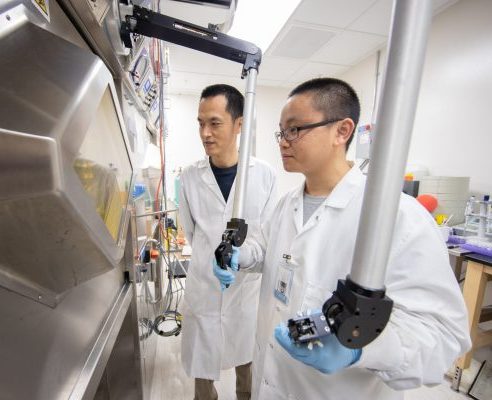The Department would like to recognize Cyclotron and Radiochemistry Research Program Director Zibo Li, PhD, for receiving NIH awards to study both molecular therapeutics in lung cancer treatment and novel PET methodology. 
In April 2020, Dr. Li received National Institute of Biomedical Imaging and Bioengineering (NIBIB) R01 funding ($467K+) to establish radiolabeling methodology for modifying biologically active molecules and drugs in novel PET agent preparation. Study success would equip radiochemists with a fast-growing technology to prepare and use novel PET agents through radiolabeling bioactive molecules in drug D&D and other areas.
Through January 2024, Li’s team aims to overcome the lack of efficient, simple radiolabeling methods for modifying biologically active small molecules and drugs used in late-stage radiofluorination and radiocyanation of aromatic substrates. Successfully established methodologies for bioactive molecular labeling will lead to broadly-useful, late-stage radiolabeling methods for incorporating [18F]F and [11C]CN into aromatic compounds. If a first-stage breakthrough installs radioisotopes into bioactive molecular aromatic or heteroaromatic motifs, this experimentation paves the ways for direct drug-to-PET agent conversion, as well as unprecedented access to novel aromatic PET tracers.

Dr. Li noted: “This study could have a transformative, high impact in biomedical imaging through providing access to novel PET agents that have proven challenging or impossible to synthesize. A key strength of our study design is the extensive preliminary data for our proposed approaches. Broadening radiolabeling methodology under mild conditions, coupled with easy access to the required precursors, provides unprecedented access to novel aromatic PET tracers. Our success would produce optimal research results in neurology, oncology, and other areas that use PET technology.”
In December 2019, the National Cancer Institute (NCI)’s Small Business Innovation Research (SBIR) program awarded Dr. Li Research/Research and Development (R/R&D) funding ($93.5K) for his proposal entitled, “SBIR: Combinatory Treatment Modalities Utilizing Radiation to Locally Activate Systemically Delivered Therapeutics.” Dr. Li has partnered with North Carolina-based biotechnology research innovator Zymeron Corporation to develop a novel molecular probe with commercial potential to prevent, diagnose, and treat lung cancer.
Over six months (12/1/19 – 5/31/20), Li’s team is conducting an early-stage, cell-based in vitro study and corresponding in vivo irradiation experiment using Zymeron nanoparticle agents and irradiation at UNC’s Biomedical Research Imaging Center (BRIC). Study aims are to distinguish the histology, biodistribution and treatment effects on lung cancer cases versus controls. Favorable results allow Li’s study to advance this novel, early-stage R&D molecular probe to the NCI SBIR program’s Phase II.
The Li-Zymeron collaboration carries out the NCI’s SBIR mission through funding an R&D biotechnology innovator to develop novel molecular therapeutics technology for lung cancer treatment using an established molecular therapeutics investigator’s expertise and institutional resources.
